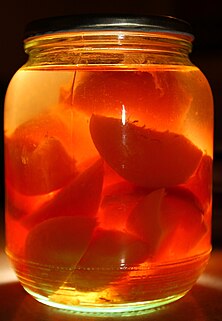Kompot or compot, as prepared in Central and Eastern Europe and West Asia, refers to boiled fruits (typically fresh or dried) served either as a drink or a dessert depending on the region. When served as a dessert, it is essentially identical to the French compote, which is where the term "kompot" originates from. When served as a drink, it is also known as vzvar (взвар) or uzvar (узвар), from a Slavic root word meaning "to boil".
You can help expand this article with text translated from the corresponding article in French. (March 2023) Click [show] for important translation instructions.
|
This article may have misleading content. (September 2023) |
As a drink, kompot is a sweet, non-alcoholic beverage that may be served hot or cold, depending on tradition and season. It is created by cooking fruit such as strawberries, apricots, peaches, apples, raspberries, rhubarb, plums, or sour cherries in a large volume of water, often together with sugar, honey, or raisins as additional sweeteners. Sometimes different spices, such as vanilla or cinnamon, are added for additional flavour, especially in the winter, when kompot is usually served hot. Kompot is popular in Central and Eastern European countries, as well as in Southern Europe.[citation needed]
Kompot is part of the cuisine of many countries in Central, Eastern, and Southern Europe, as well as in the Middle East and West Asia. It is known by a variety of names in these countries, such as компот (kompot) in Russian, Ukrainian and Bulgarian, kompót in Slovak and Hungarian, kompotas in Lithuanian, κομπόστα (kompósta) in Greek, and komposto in Turkish.[1][2][3] Making kompot was a common way of preserving fruit for the winter in Southern and Eastern European countries; in 1885, Lucyna Ćwierczakiewiczowa wrote in a recipe book that kompot "preserved fruit so well it seemed fresh".[4] Kompot is also popular in many Central Asian countries, such as Uzbekistan and Kyrgyzstan.[5]
In the colder parts of Europe, instead of stewing the fruits and then preserving the result, the fruits are dried and then rehydrated to make kompot. This method is notably used in the twelve-dish Christmas Eve supper prepared in the former Polish-Lithuanian Commonwealth.[citation needed]
The consumption of kompot has been declining since the 1980s. With the end of food preservation in many Southern and Eastern European countries[citation needed], kompot has been supplanted by fruit juice, soft drinks and mineral water.[6]
See also
References
External links
Wikiwand in your browser!
Seamless Wikipedia browsing. On steroids.
Every time you click a link to Wikipedia, Wiktionary or Wikiquote in your browser's search results, it will show the modern Wikiwand interface.
Wikiwand extension is a five stars, simple, with minimum permission required to keep your browsing private, safe and transparent.

